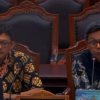Independen --- The morning sun had not fully risen when Amalia Astrid Regina left her home in BTN Tawang Alun, Ranomeeto subdistrict, South Konawe (Konsel) district to her workplace at Zenith Kendari hotel. The journey from her house to the hotel, which was located in the Korumba subdistrict at the provincial capital Kendari, took about 25 minutes.
Before leaving, Regina checked the contents of her bag.
“Face mask, hand sanitizer, wet wipes. All right, complete,” she said reassuringly to herself, knowing that she had brought all of her essential items with her.
Regina also did not forget her casual long-sleeved cardigan to complete her look. Yes, the check was her routine every morning, as a part of her protective equipment at work amid the current pandemic outbreak.
Working as a hotel marketing staff, Regina had to meet with other businesses to collaborate and make promotional offers to clients.
The 29 years old woman said that she and dozens of her colleagues were sent home for three months due to the decline in hotel occupancy at the start of the pandemic.
It was only in July that she was allowed to return to work. Even during an outbreak, there was almost no change to her activities. Except for one thing, she must adapt to the Covid-19 health protocols in her daily life, or dubbed nationally as the “new normal.” From wearing a mask in public places, washing hands often, and maintaining a safe distance from other people when doing activities.
But even though she had returned to work, Regina had yet to work full time as the hotel had imposed a rotating work system for its employees.
“The [hotel] distributed [our work hours], employees work in shifts. Some stay home, some come to work. [We] are also not being paid in full, but according to our workdays,” Regina told zonasultra.com in mid-August.
Working amidst a pandemic has its challenges, she said, adding that her biggest concern was the risk of contracting the Wuhan-originated virus. Having to meet new people every day as part of her work was dilemmatic for her. If she does not work, then she would not get paid. Meanwhile, her work also puts her at risk of being exposed to the coronavirus. But, she did not have much choice.
Of course, the main reason was that it concerned her family’s daily life necessities that must be fulfilled. Both Regina and her husband worked. But, they have to support her parents and younger siblings, who all live together. Especially during the pandemic, Regina only received half of her wage due to the limitation on her working days.
“[If we] don’t work, then we don’t eat. [But] going back to work means there is a risk of being exposed to Coronavirus. [We] have no choice [and yet] there is no right option. If we don’t meet with people, then we won’t get new guests. No new guests mean no pay,” explained Regina, who had been working at the hotel since 2016.
Wardani (23), who worked at state-owned Sultra Bank, had a similar experience. This would be her second year working at the bank. She admitted that she had been required to be physically present at work since the beginning of the pandemic.
Graduated from Haluoleo University’s Economics Faculty, Wardani had been working as a teller. As a frontline worker, she could not avoid physical contact with different customers. She dealt with withdrawals, transfers, and deposits of their funds every day.
Wardani added that these activities made her very worried about being exposed to the virus. Even though officials had ensured that all procedures had followed pandemic prevention and control protocols.
“Our job puts us at risk of contracting [the virus]. Some banks have to close because their employees were tested positive [for the virus]. This virus is invisible to the eye. I have anxieties. I must not get infected [but] you can’t see [it],” Wardani told zonasultra.com in mid-August.
Secretary of the Indonesian Hotel and Restaurant Association (PHRI) for Southeast Sulawesi Eko Dwi Sasono said that the Covid-19 pandemic hit all sectors, including the hotel and restaurant industry. A week after the local government announced the first Covid-19 case in Kendari, hotels were required to close immediately. Of the existing 300 hotels, 90 percent had to close.
Sasono, who had owned a hotel for 15 years in the Tipulu area, also had to close his business and laid off his employees following the outbreak.
“Covid-19 automatically destroyed the service sector. In the beginning, [it was considered] lucky if a hotel had 10 percent occupancy. From July until today, only hotel occupancy stood at 40 percent. The Coronavirus, for six months, had reduced guests and events to zero, be it governmental or domestic,” said Sasono.
Renting spaces for work meetings, incentives, conferencing, and exhibition (MICE) had also decreased along with government advice to withhold face-to-face meetings and activities. Unfortunately, according to Sasono, 70 percent of the province’s hospitality industry depended on the government. This had caused many hotel policies to send their employees home or even lay them off.
Head of the Industrial Relations and Social Security Division at the Southeast Sulawesi Manpower and Transmigration Office Muhammad Amir Taslim said that there were 2,351 employees or workers from 86 companies in 17 districts/cities being sent home. From the tally, as many as 97 workers were laid off.
Unfortunately, according to Taslim, it was unknown how many of them were female workers of this number. However, he said, male workers still dominate the formal sector.
Even so, Taslim continued, the Southeast Sulawesi administration provided non-cash assistance such as essential food staples for the workers who lost their employment. The aid was distributed for three months, from May through July. It was meant as the local government’s support for the people’s economic condition.
The central government also distributed pre-employment cards as part of its effort to cushion the Coronavirus pandemic’s economic impact. Forty-eight thousand people in Southeast Sulawesi had received the card.
The Ministry of Manpower also provided wage subsidy for workers in the formal sector registered at the state social security agency BPJS until June 30. There were 79,000 companies registered with a total of approximately 91,000 workers. However, only about 5,000 workers had already received the Rp600,000 subsidy from September to December.
“There are companies that registered their employees for BPJS to get protection so that when there is a risk, the state is present,” explained Taslim.
Protection during the Pandemic
The Southeast Sulawesi Women’s Alliance (Alpen), a non-profit organization based in Kendari that campaigned for the protection of women’s rights and the elimination of discrimination and exploitation against women, warned against the many female workers at risk of contracting the Coronavirus for being in the front line as health and medical workers.
Other work lines with similar risks directly deal with customers such as cashier, receptionist, customer service, and marketing officers.
Alpen Director Midha Karim explained that female workers in formal and informal sectors should demand better protection during the pandemic.
Female workers in the time of a pandemic needed protection in terms of policy and from Covid-19 transmission. Besides, they also need to receive incentives from government programs.
Company policies that sent workers home with partial or even no pay would impact employee welfare. For female daily wage workers, this policy meant that they lost their income because they were considered absent.
“Covid-19 should not be an excuse to send employees home without wage or cutting wages below the minimum standard. The pandemic is now being made an excuse for companies to issue policies that are detrimental to workers and against the Labor Law,” Karim told zonasultra.com a while ago.
Furthermore, during the pandemic, Karim said she was also worried about the excessive burden and pressure faced by female workers, especially those with their own families. It means that they are also responsible for domestic affairs such as taking care of their husbands, their children, cleaning their homes, and even as teachers accompanying their children who are studying at home.
“And the work gets harder when all family members are at home,” said Karim, adding that it could trigger stress levels and interfere with women’s mental health.
Who is More Aware of the Pandemic’s Danger?
Apart from facing problems that plagued women due to the pandemic, they are also expected to play a significant role in optimizing a “new normal” adaptation that is in line with recommended health protocols to break the SARS-CoV-2 viral transmission.
Alpen’s Karim was referring to the National Covid-19 Response Task Force survey that showed that women are more likely to obey the health protocol than men.
On the parameter of standard health protocols—physical distancing, frequent handwashing, facial masks, the survey revealed that women tend to be more disciplined and obedient. Therefore, women have a significant role in breaking Covid-19 transmission, according to Karim.
In maintaining physical distance, 77 percent of women said they adhered to it compared to 67 percent of men. Women also tend to wash their hands more often (85 percent) than 76 percent of their male counterparts. The use of facial masks in women was even more prevalent, at 89 percent, compared to men at 77 percent.
“I tend to see women as more disciplined than men. This is a force that should be reckoned with by the government to focus its campaign. In return, it is women who would educate. Starting from the community’s smallest circle, their families, friends, and partners. And so, women can help narrow the chain of transmission of the Coronavirus,” said Karim.
Reporter: Rosniawaty Fikri/D02
*This article was published in Bahasa at Zonasultra.com in September 2020









